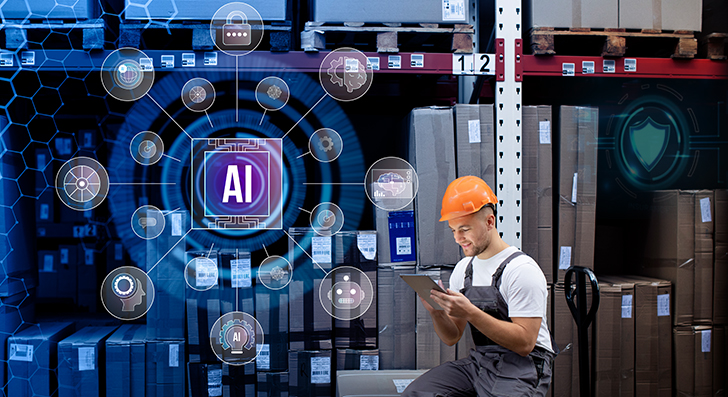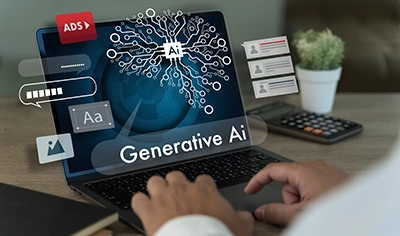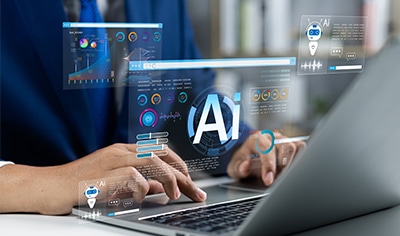The manufacturing and industrial sectors have long been at the forefront of embracing technological advancements, from the early days of mechanization to the modern era of Industry 4.0. Aided by emerging technologies, including the Internet of Things (IoT), Robotics, Blockchain, Intelligent Automation, and Artificial Intelligence, the manufacturing industry is currently undergoing another wave of technological evolution characterized by unprecedented innovation, precision, and efficiency.
At the forefront of this revolution lies Generative AI, a catalyst that not only revolutionizes the manufacturing landscape but also leads the way in the development of smart factories of the future, where machines guided by deep-learning models and neural networks, seamlessly collaborate with human ingenuity and push the boundaries of what’s achievable. In other words, Generative AI ushers in an era where machines are not just tools following instructions but creative partners that innovate, ideate, and generate novel solutions based on the data they have been trained on. This may be one of the reasons why the global market size of Generative AI in manufacturing is surging rapidly and is estimated to reach 6,963.45 million USD by 2032, at a healthy CAGR of 41%. In fact, the scope of Generative AI in the manufacturing industry is expansive, encompassing the entire production lifecycle from design to workflow optimization, cost reduction, adaptive quality control and predictive maintenance, responsive supply chain management, human-machine collaboration, and continuous improvement.
5 Practical Generative AI Applications in Manufacturing
The applications of Generative AI in manufacturing are multifaceted, promising to revolutionize the way products are conceptualized, designed, and produced. Let’s dive deep into the Generative AI applications that have limitless potential to drive the manufacturing industry toward new frontiers of possibility.
1. Innovative Product Design
Generative AI transforms the landscape of innovative product design in manufacturing by generating a multitude of design alternatives based on specified parameters and objectives. Through the utilization of advanced algorithms, Generative AI not only accelerates the time-intensive aspects of product development, such as conceptualization, rapid prototyping, and iteration but also uncovers novel solutions. This transformative capability of Generative AI allows product designers to go beyond traditional approaches to explore an expansive design space while pushing the creative boundaries of what’s possible in terms of product aesthetics, functionality, and efficiency.
2. Optimized Production Workflows
Generative AI plays a pivotal role in redefining the manufacturing landscape through the optimization of production workflows. By leveraging the power of neural networks, deep-learning models, and advanced algorithms, Generative AI analyzes vast datasets of manufacturing processes and offers real-time insights for improved operational efficiency. As a strategic tool, Generative AI doesn’t merely streamline production workflows but it comes with an innate potential to autonomously adapt and optimize processes dynamically, enabling manufacturers to stay ahead. For instance, a manufacturing unit can leverage the potential of Generative AI to create optimized floor plans by analyzing process flows, factory layouts, and historical production data. These floor plans may entail reconfiguration of the placement of assembly stations, machinery, and storage areas to reduce the distance traveled by materials and components and optimize the flow of work-in-progress. As a result, the manufacturing unit can achieve lower production costs, higher throughput, and improved resource utilization, ultimately enhancing competitiveness in the market.
3. Supply Chain Management
Another popular application of Generative AI in manufacturing is supply chain management. Generative AI can optimize several aspects of the supply chain operations by leveraging sophisticated algorithms and neural network capabilities. For instance, the predictive analytics capability of the technology is pivotal for forecasting demand patterns, allowing manufacturers to adjust production levels and minimize the risk of overstock or shortages. Furthermore, Generative AI plays a critical role in inventory management by analyzing historical data and suggesting optimal stocking levels. This strategic approach ensures that products are readily available to meet customer demands. Lastly, the technology can analyze historical transportation data, weather forecasts, and traffic patterns to generate optimized delivery schedules that balance cost, speed, and reliability.
4. Real-Time Quality Control and Predictive Maintenance
Generative AI plays a critical role in quality control and predictive maintenance by continuously analyzing and learning from production data in real-time. It utilizes advanced algorithms to identify subtle defects in real-time while ensuring the products meet stringent quality standards. This eliminates the risk of defective products reaching consumers. In fact, real-time quality checks can mitigate defects by 15% and optimize the overall product quality significantly.
The technology’s ability to process large volumes of data proves indispensable in optimizing equipment performance and minimizing downtime. By monitoring and analyzing historical performance data of equipment, Generative AI-powered systems can predict potential failure before it occurs. This foresight facilitates manufacturers to take preemptive maintenance measures, avoiding costly disruptions while extending the lifespan of equipment.
5. Continuous Improvement
Generative AI serves as a catalyst for continuous improvement and innovation in manufacturing through continuous learning and adaptation. The technology capability to generate insights based on real-time data and feedback facilitates a dynamic cycle of improvement across various facets of production. In short, embracing Generative AI for continuous improvement and innovation not only positions manufacturers to meet current industry standards but also anticipate and exceed future expectations.
Transformative Use Cases of Generative AI Across Industries
Business Benefits of Generative AI in Manufacturing
a) Cost Reduction and Resource Optimization
Generative AI proves to be a game-changer in manufacturing by identifying opportunities for cost reduction and resource optimization. In other words, Generative AI empowers manufacturers to identify areas where costs can be minimized without compromising efficiency. This may lead to reduced wastage and optimized resource management, contributing to cost-effective and sustainable manufacturing practices. Furthermore, Generative AI leverages advanced algorithms to provide a holistic view of resource utilization, ensuring a streamlined production environment.
b) Strategic Decision-making
Generative AI comes with an innate potential to analyze large chunks of data quickly and accurately, providing actionable insights to manufacturers for strategic decision-making pertaining to areas like supply chain optimization, inventory management, and production planning.
c) Improved Efficiency
Generative AI can automate a multitude of aspects of the manufacturing process, from ideation to design, workflow optimization, quality control, and supply chain management, accelerating product development and improving overall operational efficiency.
Summing Up
The integration of Generative AI into the manufacturing processes is not just a technological stride; instead, it’s a revolutionary leap into a future where adaptability, efficiency, and creativity converge to redefine industry standards. This transformative technology is a strategic enabler that positions manufacturers at the forefront of innovation. If you are also planning to leverage the potential of this emerging technology that has become synonymous with manufacturing excellence, you may consider seeking consultation from a reliable AI partner.






